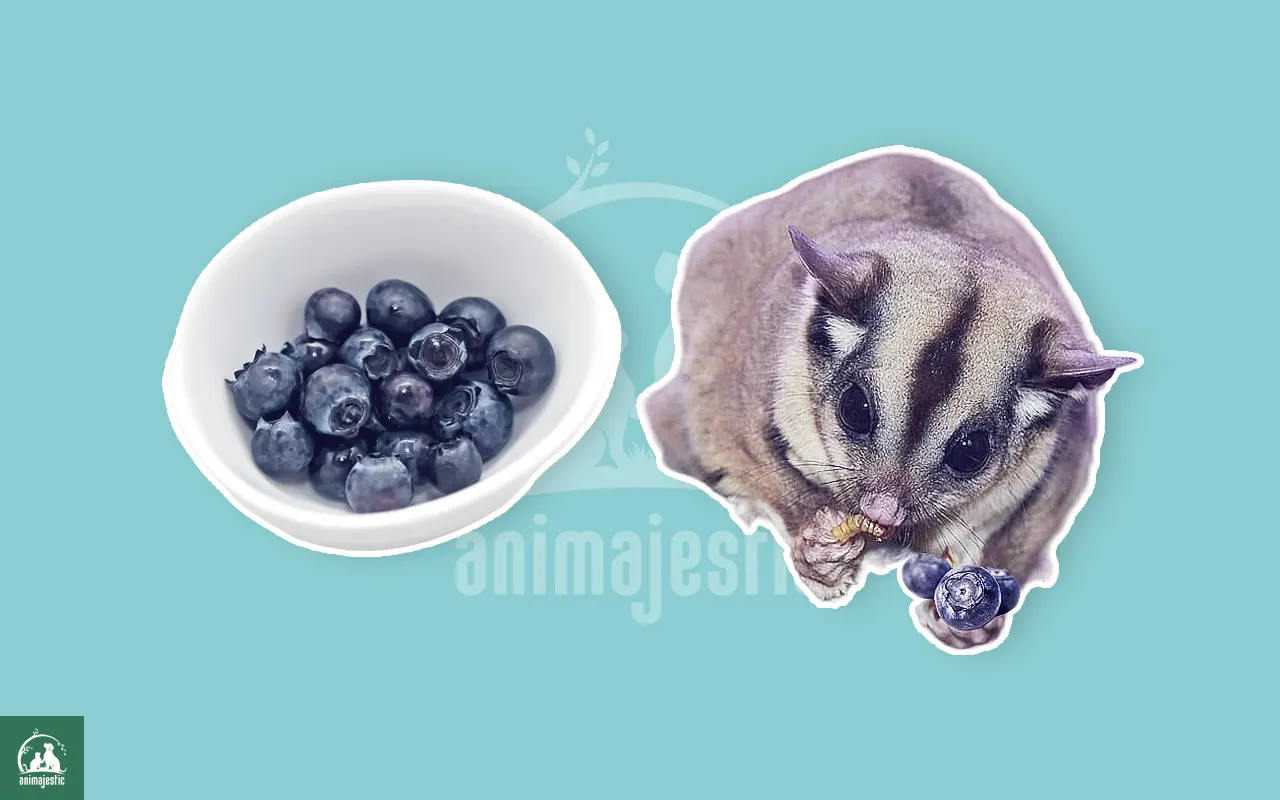Sugar gliders, scientifically known as Petaurus breviceps, are small marsupials that have gained popularity as exotic pets due to their unique appearance and social nature.
As omnivores, sugar gliders have a diverse diet in the wild, which consists of nectar, fruit, insects, and even small vertebrates. But when kept as pets, it’s crucial to provide a well-balanced and varied diet to ensure their health and happiness.
One question that often arises among owners is whether sugar gliders eat blueberries or not, and we will be doing our very best to walk you around everything associated with feeding this fruit to this awesome pet of yours.
Can Sugar Gliders Eat Blueberries?
The short answer to the question of whether sugar gliders can eat blueberries is YES. Blueberries can be a healthy and nutritious treat for your sugar glider when fed in moderation.
These small fruits are packed with antioxidants, vitamins, and minerals that can contribute positively to your sugar glider’s overall health.
Nutritional Benefits of Blueberries for Sugar Gliders
Blueberries are rich in various essential nutrients that can benefit your sugar glider’s health, including:
- Vitamin C: This vitamin is vital for maintaining a healthy immune system, facilitating wound healing, and acting as an antioxidant to protect the body from harmful free radicals.
- Vitamin K: This nutrient is crucial for blood clotting and maintaining strong bones, as it plays a significant role in calcium metabolism.
- Fiber: Blueberries contain a good amount of dietary fiber, which is essential for maintaining a healthy digestive system and promoting regular bowel movements.
- Antioxidants: Blueberries are known for their high antioxidant content, particularly anthocyanins, which give the fruit its blue color. These antioxidants can help protect your sugar glider’s cells from damage caused by free radicals and support overall health.
- Manganese: This essential mineral is necessary for proper bone development, enzyme function, and metabolism. Blueberries are a good source of manganese, which can support your sugar glider’s overall well-being.
Feeding Guidelines for Blueberries and Sugar Gliders
While blueberries can be a healthy treat for your sugar glider, it’s essential to follow some guidelines to ensure they are fed safely and in moderation:
- Wash the blueberries: Always wash blueberries thoroughly before feeding them to your sugar glider to remove any pesticides, contaminants, or dirt that might be present.
- Portion size: Offer your sugar glider only a few blueberries at a time, as too much fruit can lead to an imbalanced diet and potential health issues. A general guideline is to provide one or two blueberries per feeding, depending on the size of the fruit and your sugar glider.
- Frequency: Feed blueberries as an occasional treat, not more than once or twice a week. Overfeeding fruit can lead to obesity, diarrhea, and other health problems in sugar gliders, as their natural diet is primarily composed of nectar, insects, and other protein sources.
- Monitor your sugar glider: Keep an eye on your sugar glider’s reaction to blueberries. If they show any signs of digestive upset, such as diarrhea, or an allergic reaction (which is rare but possible), discontinue feeding blueberries and consult your veterinarian.
- Variety: To ensure a balanced diet for your sugar glider, offer a variety of fruits and vegetables, along with their staple protein sources. This will help prevent nutritional deficiencies and maintain optimal health.
Potential Risks and Precautions
As with any food, there are potential risks and precautions to consider when feeding blueberries to your sugar glider:
- Pesticides and chemicals: Conventionally grown blueberries may contain pesticides and other chemicals that could be harmful to your sugar glider. To minimize this risk, opt for organic blueberries or thoroughly wash the fruit before feeding.
- Choking hazard: Although blueberries are small, there is a slight risk of choking, especially for young or smaller sugar gliders. To reduce this risk, you can cut the blueberries in half or mash them before feeding them.
- Imbalanced diet: Feeding too many blueberries or other fruits can lead to an imbalanced diet, as sugar gliders require a balance of carbohydrates, proteins, and fats for optimal health. Ensure that blueberries are fed as an occasional treat and not as a primary food source.
Conclusion
Sugar gliders can safely eat blueberries as an occasional treat, and these fruits can provide valuable nutrients to support their overall health. However, it’s essential to practice moderation and ensure that your sugar glider’s diet remains balanced and varied.
Always consult your veterinarian if you have concerns about your sugar glider’s diet or health, and monitor their reaction to any new foods introduced into their diet. By providing a diverse and nutritionally balanced diet, you can help ensure the health they desire.
